- Home
- Elizabeth George
This Body of Death Page 21
This Body of Death Read online
Page 21
A sign on a makeshift counter indicated the time when the artist would return. Ardery glanced at this and then at her watch, after which she said to Lynley, “Let’s have some refreshment.”
They sought said refreshment back the way they’d come, down below the tobacconist in the courtyard. The violinist who’d played there earlier was gone, and it was just as well, because Ardery apparently wanted conversation along with her refreshment. This turned out to be a glass of wine, at which Lynley lifted an eyebrow.
She saw this. “I’ve no objection to a glass of wine on duty, Inspector Lynley. We deserve one after J-a-y-s-o-n. Please join me. I hate to feel like a lush.”
“I think I won’t,” he said. “I hit it rather hard after Helen died.”
“Ah. Yes. I expect you did.”
Lynley ordered mineral water in turn at which Ardery lifted her own eyebrow. She said to him, “Not even a soft drink? Are you always this virtuous, Thomas?”
“Only when I want to impress.”
“And do you?”
“Want to impress you? Don’t we all? If you’re to be the guv, then it serves the rest of us to begin jockeying for positions of prominence, doesn’t it?”
“I have serious doubts that you’ve spent much time jockeying for any position.”
“Unlike yourself? You’re climbing quickly.”
“That’s what I do.” She looked round the courtyard in which they sat. It wasn’t as crowded as the area above them since here there was only the restaurant cum wine bar at the base of a wide stairway. But it was crowded enough. Every table was taken. They’d been lucky to find a spot to sit. “God, what a mass of humanity,” she said. “Why d’you reckon people come to places like these?”
“Associations,” he said. She turned back to him. He fingered a crockery bowl holding cubes of sugar, rotating it in his fingers as he went on. “History, art, literature. The opportunity to imagine. Perhaps a revisiting of a place from childhood. All sorts of reasons.”
“But not to buy T-shirts saying ‘Mind the gap’?”
“An unfortunate by-product of rampant capitalism.”
She smiled at this. “You can be mildly amusing.”
“So I’ve been told, generally with the stress on mildly.”
Their drinks arrived. He noticed that she took hers up with some alacrity. She apparently noticed him noticing. “I’m trying to drown the memory of Jayson. It was the appalling earlobes.”
“An interesting stylistic choice,” he admitted. “One wonders what the next fad will be now that bodily mutilation is in vogue.”
“Branding, I daresay. What did you make of him?”
“Aside from his earlobes? I’d say his alibi will be simple enough to confirm. The copies of receipts from the till will have the time of day printed on them—”
“Someone could have stood in his place in the shop, Thomas.”
“—and likely there’s going to be a regular customer or two, not to mention another shopkeeper hereabouts, who’ll be able to confirm he was here. I don’t see him as likely to tear open someone’s jugular vein, do you?”
“Admittedly, no. Paolo di Fazio?”
“Or whoever might be at the other end of the postcards. That was a mobile number on it.”
Isabelle reached for her handbag and brought the postcards out. Jayson had given them over with a “happy to be rid of them, darling,” upon her request. She said to Lynley, “They make things interesting,” and then observing him, “which brings us to Sergeant Havers.”
“Speaking of interesting,” he noted wryly.
“Have you been happy working with her?”
“I have been, very.”
“Despite her …” Ardery seemed to search for a word.
He supplied her with several. “Recalcitrance? Obstinate refusal to toe the line? Lack of finesse? Intriguing personal habits?”
Ardery brought her wine to her lips, and she examined him over the glass rim as she drank. “You’re rather oddly paired. One wouldn’t expect it. I think you know what I mean. I do know she’s had professional difficulties. I’ve read her personnel file.”
“Just hers?”
“Of course not. I’ve read everyone’s. Yours as well. I mean to have this job, Thomas. I mean to have a team that works like a well-oiled machine. If Sergeant Havers turns out to be a loose screw in the works, I’m going to get rid of her.”
“Is that why you’re advising change?”
She frowned. “Change?”
“Barbara’s clothing. The makeup. I expect to see her with her teeth repaired and sporting a designer hairdo next.”
“It doesn’t hurt a woman to look her best. I’d advise a man on my team to do something about his appearance if he came to work looking like Barbara Havers. As it happens, she’s the only one who comes to work looking like she’s slept rough the night before. Hasn’t anyone ever spoken to her before? Didn’t Superintendent Webberly? Didn’t you?”
“She is who she is,” Lynley said. “Good mind and big heart.”
“You like her.”
“I can’t work with people I don’t like, guv.”
“In private conversation, it’s Isabelle,” she said.
His eyes met hers. He saw hers were brown, as his were, but not uniformly so. They were richly speckled with hazel and he reckoned that if she wore different colours to what she had on at present—a cream-coloured blouse beneath a well-tailored russet jacket—they might even appear green. He shifted his gaze and took in their surroundings. He said, “This is hardly private, is it?”
“I think you know what I mean.” She glanced at her watch. She still had half a glass of wine left and before she stood, she tossed the rest of it down. “Let’s find Paolo di Fazio,” she told him. “He should be back at his stall by now.”
HE WAS. THEY found him in the midst of attempting to persuade a middle-aged couple to have masks made as souvenirs of their silver wedding anniversary trip to London. He’d brought forth his artistic instruments and laid them on the counter, and he’d set up a collection of sample masks as well. These were mounted on rods that were fixed onto small plinths of finished wood. Fashioned from plaster of Paris, the masks were startlingly lifelike, similar to the death masks that had once been created from the corpses of people of significance.
“The perfect way for you to remember this visit to London,” di Fazio told the couple. “So much more meaningful than a coffee mug with a Royal’s face on it, eh?”
The couple hesitated. They said to each other, “Should we … ?” and di Fazio waited for their decision. His expression was polite, and it didn’t alter when they said they would have to think about it.
When they moved off, di Fazio gave his attention to Lynley and Ardery. “Another fine-looking couple,” he said. “Each of you has a face made for sculpture. Your children are, I expect, as handsome as you.”
Lynley heard Ardery snort with amusement. She showed her warrant card and said, “Superintendent Isabelle Ardery. New Scotland Yard. This is DI Lynley.”
Unlike Jayson Druther, di Fazio knew at once why they were there. He took off the wire-framed spectacles he wore, began to polish them on the front of his shirt, and said, “Jemima?”
“You know about what’s happened to her, then.”
He returned the glasses to his face and ran a hand over longish dark hair. He was a good-looking man, Lynley saw, short and compact but with shoulders and chest suggesting that he worked with weights. Di Fazio said abruptly, “Of course I know what’s happened to Jemima. All of us know.”
“All? Jayson Druther had no idea what’s happened to her.”
“He wouldn’t,” di Fazio said. “He’s an idiot.”
“Did Jemima feel that way about him?”
“Jemima was good to people. She would never have said.”
“How did you learn of her death?” Lynley asked.
“Bella told me.” He added what Barbara’s report had indicated: that he was one of
the lodgers at the home of Bella McHaggis in Putney. In fact, he was the reason, he said, that Jemima had established a lodging place with Mrs. McHaggis. He’d told her about a vacant room there not long after he’d met her.
“When was this?” Lynley asked.
“A week or two after she got to London. Sometime last November.”
“And how did you meet her?” Isabelle asked.
“At the shop.” He went on to say that he rolled his own, and he bought both his tobacco and his papers from the cigar shop. “Usually from that idiot, Jayson,” he added. “Pazzo uomo. But one day Jemima was there instead.”
“Italian, are you, Mr. di Fazio?” Lynley asked.
Di Fazio took a rollie from the pocket of his shirt—he wore a crisp white shirt and a very clean pair of jeans—and he put it behind his ear. He said, “With a name like di Fazio, that’s an excellent deduction.”
“I think the inspector meant a native of Italy,” Isabelle said. “Your English is perfect.”
“I’ve lived here since I was ten.”
“You were born … ?”
“In Palermo. Why? What does this have to do with Jemima? I came here legally, if that’s what you’re interested in, not that it matters much these days with the EU mess and people wandering between borders whenever they feel like it.”
Ardery, Lynley saw, indicated a change of direction with a slight lifting of her fingers from the countertop. She said, “We understand you were collecting National Portrait Gallery postcards for Jemima. Had she asked you to do that, or was it your idea?”
“Why would it have been my idea?”
“Perhaps you can tell us.”
“It wasn’t. I saw one of the cards in Leicester Square. I recognised it from the portrait gallery show—there’s a banner out front and Jemima’s picture’s on it, if you haven’t seen it—and I picked it up.”
“Where was the postcard?”
“I don’t remember …near the half-price ticket booth? Maybe near the Odeon? It was stuck up with Blu-Tack and it had the message on it, so I took it down and gave it to her.”
“Did you phone the number on the back of the card?”
He shook his head. “I didn’t know who the hell it was or what he wanted.”
“‘He,’” Lynley noted. “So you knew it was a man who’d been distributing the cards.”
It was one of those gotcha moments, and di Fazio—clearly no fool—understood this. He took a few seconds before he answered. “She told me her partner was likely doing it. Her former partner. A bloke from Hampshire. She knew from the phone number on the back of the card. She said she’d left him, but he hadn’t taken it well and now, obviously, he was trying to find her. She didn’t want to be found. She wanted to get the cards down before someone who knew where she was saw one and phoned him. So she collected them and I collected them. As many as we could find and whenever we had the chance.”
“Were you involved with her?” Lynley asked.
“She was my friend.”
“Beyond friendship. Were you involved with her or merely hoping to be involved with her?”
Again, di Fazio didn’t reply at once. He was obviously no fool, so he knew that any way he answered could make him look bad. Yes, no, maybe, or whatever, there was always the sexual element between men and women to consider and what the sexual element could lead to by way of motives for murder.
“Mr. di Fazio?” Ardery said. “Is there something about the question you don’t understand?”
He said abruptly, “We were lovers for a time.”
“Ah,” Ardery said.
He looked irritated. “This was before she came to live at Bella’s. She had a wretched room in Charing Cross Road, up above Keira News. She was paying too much for it.”
“But that’s where you and she … ?” Ardery let him complete the thought on his own. “How long had you known her when you became lovers?”
He bristled. “I don’t know what that has to do with anything.”
Ardery said nothing in answer to this and neither did Lynley. Di Fazio finally spat out, “A week. A few days. I don’t know.”
“You don’t know?” Ardery asked. “Mr. di Fazio, I have a feeling that—”
“I went in for tobacco. She was friendly, flirty, you know how it is. I asked her if she wanted to go for a drink after work. We went to that place on Long Acre …the pub …I don’t know what it’s called. It was packed, so we had a drink on the pavement with everyone else and then we left. We went to her room.”
“So you became lovers the day you met,” Ardery clarified.
“It happens.”
“And then you began to live together in Putney,” Lynley noted. “With Bella McHaggis. At her home.”
“No.”
“No?”
“No.” Di Fazio took up his cigarette. He said if they were going to talk further—and it was costing him in bloody customers, by the way—then they were going to have to do it outside where he at least could have a fag while they spoke.
Ardery told him it was absolutely fine to move outside, and he gathered up his tools and shoved them under the counter along with the sample masks on their wooden plinths. Lynley noted the tools—sharp and well suited for activities other than sculpting—and knew Ardery had done likewise. They exchanged a glance and followed di Fazio out into the open air.
There he lit his roll-up and told Lynley and Ardery the rest. He’d thought they’d continue as lovers, he said, but he hadn’t counted on Jemima’s desire to follow the rules.
“No sex,” was how he put it. “Bella doesn’t allow it.”
“Opposed to the whole idea of sex, is she?” Lynley asked.
Sex among the lodgers, di Fazio told them. He’d tried to convince Jemima that they could continue as before with no one the wiser because Bella slept like the dead on the floor above them and Frazer Chaplin—this was the third lodger—had the basement room two floors below, so he wouldn’t know what was going on either. The two of them—Jemima and di Fazio—occupied the only two bedrooms on the first floor of the house. There was no bloody way that Bella would find out.
“Jemima wouldn’t have it,” di Fazio said. “When she came to see the room, Bella told her straightaway that she’d tossed out the last lodger for getting involved with Frazer. Caught her coming out of Frazer’s room early one morning and that was that. Jemima didn’t want that to happen to her—decent lodgings are not easy to find—so she said no more sex. At first it was no sex at Bella’s and then it was no sex altogether. It had got to be too much trouble, she said.”
“Too much trouble?” Ardery asked. “Where were you having it?”
“Not in public,” he replied. “And not in Abney Park Cemetery, if that’s where you’re heading. At my studio.” He shared space with three other artists, he said, in a railway arch near Clapham Junction. At first they went there—he and Jemima—but after a few weeks, she’d had enough. “She said she didn’t like the deception,” he said.
“And did you believe her?”
“I hardly had a choice. She said it was over. She made it over.”
“Rather like she’d done with the postcard bloke? According to what she told you?”
“Rather like,” he said.
Which gave them both a motive for murder, Lynley thought.
Chapter Eleven
YOLANDA THE PSYCHIC HAD AN ESTABLISHMENT IN A MARKET area just off Queensway in Bayswater. Barbara Havers and Winston Nkata found it without too much trouble once they unearthed the market itself, which they accessed by means of an unmarked entry between a tiny newsagent and one of the ubiquitous cheap luggage shops that seemed to pop up in every corner of London. The market was the sort of place one would walk right past without noticing: a low-ceilinged, ethnic-oriented, locals-only warren of passages in which Russian cafés vied with Asian bakeries, and shops selling hookahs sat next to kiosks blaring African music.
A question asked in the Russian café produced the inform
ation that there was within the environs of the market a location called Psychic Mews. There, Barbara and Nkata were told, Yolanda the Psychic operated and, considering the hour of the day, she was likely to be present.
A little more wandering brought them to Psychic Mews. This turned out to be what seemed like—but probably wasn’t—an authentic old mews complete with cobbled street and buildings having the appearance of former stables, like all mews in London. Unlike other mews, however, it was under the protection of a roof, as was the rest of the market. This afforded Psychic Mews an appropriate atmosphere of gloom, mystery, and even danger. One expected, Barbara thought, Jack the Ripper to leap down from a rooftop at any moment.
Yolanda’s business was one of three psychic sanctuaries in the place. Its single window—curtained for the privacy of clients within—bore a sill of accouterments appropriate to her line of employment: a porcelain hand with its palm outward and all the lines upon it identified, a similar porcelain head with various parts of the skull indicated, an astrological chart, a deck of tarot cards. Only the crystal ball was missing.
“You believe this muck?” Barbara asked Nkata. “Read your horoscope in the paper or anything?”
Winston compared his palm to the porcelain one in the window. “’Cording to this, I should’ve died last week,” he noted, and he shouldered open the door to the place. He had to duck to get inside, and Barbara followed him into an anteroom in which incense burned and sitar music played. Against a wall, the form of the elephant god was rendered in plaster and across from it, a crucifix hung above what seemed to be a kachina doll, while an enormous Buddha on the floor appeared to serve the purpose of a doorstop. Yolanda looked to be someone who covered all the spiritual bases, Barbara concluded.
“Anyone here?” she called.
In reply a woman emerged from behind a beaded curtain. She wasn’t dressed as Barbara had expected. One somehow thought a psychic would be decked out in gypsy gear: all scarves, colourful skirts, and heaps of gold necklaces with matching hoop earrings of massive size. But instead, the woman wore a business suit that Isabelle Ardery would have heartily approved of as it was tailored to fit her somewhat stout body and even to Barbara’s unschooled eyes it seemed to announce itself with the words French designer. Her one bow to stereotype was the scarf she used, but even this she’d only folded into a band to hold back her hair. And instead of black, the hair was orange, a rather disturbing shade that suggested an unfortunate encounter with a bottle of peroxide.

 Well-Schooled in Murder
Well-Schooled in Murder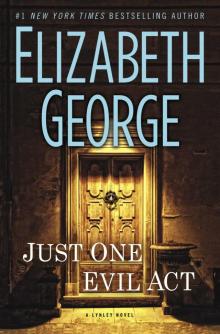 Just One Evil Act
Just One Evil Act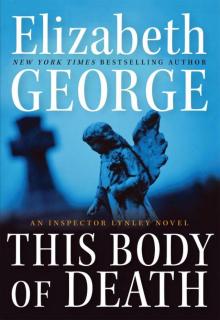 This Body of Death
This Body of Death The Edge of the Water
The Edge of the Water For the Sake of Elena
For the Sake of Elena Believing the Lie
Believing the Lie The Edge of the Shadows
The Edge of the Shadows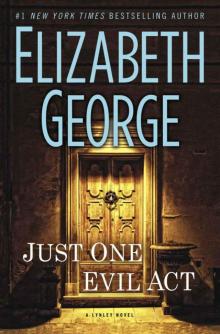 Just One Evil Act: A Lynley Novel
Just One Evil Act: A Lynley Novel In Pursuit of the Proper Sinner
In Pursuit of the Proper Sinner A Moment on the Edge:100 Years of Crime Stories by women
A Moment on the Edge:100 Years of Crime Stories by women Elizabeth I
Elizabeth I I, Richard
I, Richard A Traitor to Memory
A Traitor to Memory Missing Joseph
Missing Joseph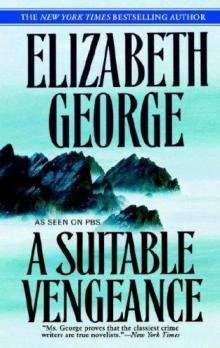 A Suitable Vengeance
A Suitable Vengeance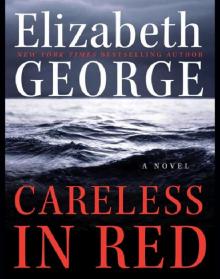 Careless in Red
Careless in Red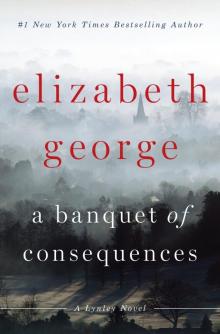 A Banquet of Consequences
A Banquet of Consequences Playing for the Ashes
Playing for the Ashes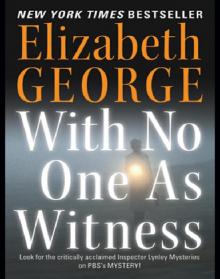 With No One As Witness
With No One As Witness Deception on His Mind
Deception on His Mind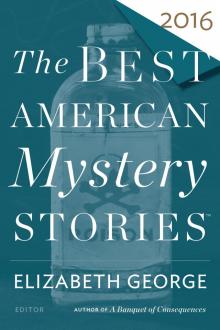 The Best American Mystery Stories 2016
The Best American Mystery Stories 2016 A Great Deliverance
A Great Deliverance In the Presence of the Enemy
In the Presence of the Enemy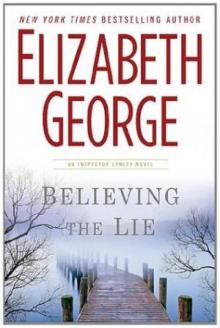 Believing the Lie il-17
Believing the Lie il-17 The Edge of the Light
The Edge of the Light SW01 - The Edge of Nowhere
SW01 - The Edge of Nowhere A Place of Hiding
A Place of Hiding What Came Before He Shot Her il-14
What Came Before He Shot Her il-14 Payment In Blood
Payment In Blood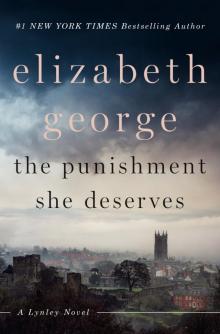 The Punishment She Deserves
The Punishment She Deserves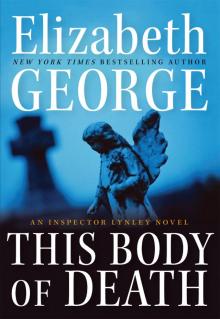 This Body of Death: An Inspector Lynley Novel
This Body of Death: An Inspector Lynley Novel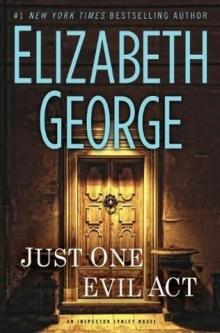 Just One Evil Act il-18
Just One Evil Act il-18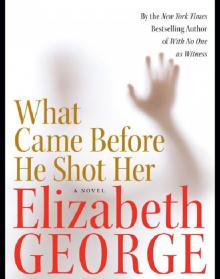 What Came Before He Shot Her
What Came Before He Shot Her Missing Joseph il-6
Missing Joseph il-6